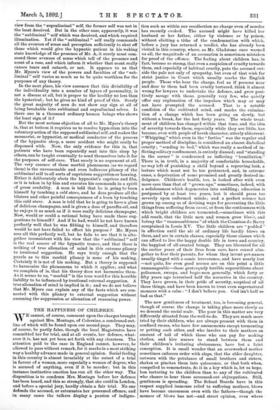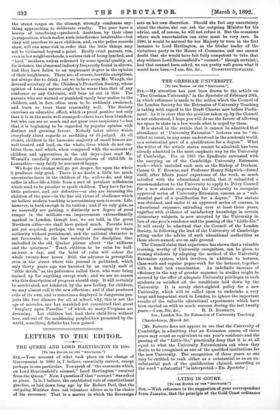THE HAPPINESS OF CHILDREN.
WE cannot, of course, comment upon the charges brought against Mrs. Montagu, of Coleraine, a condensed out- line of which will be found upon our second page. They may, of course, be partly false, though the local Magistrates have committed her for trial, and at all events, her defence, what- ever it is, has not yet been set forth with any clearness. The attention paid to the case in England cannot, however, be allowed to pass without remark, for it marks in a most striking way a healthy advance made in general opinion. Social feeling in this country is almost invariably at the outset of a trial in favour of a woman, more especially a woman of degree, who is accused of anything, even if it be murder; but in this instance instinctive emotion has run all the other way. The disposition is to condemn Mrs. Montagu before her defence has been heard, and this so strongly, that she could in London, and before a special jury, hardly obtain a fair trial. No one defends the accused, or extenuates her presumed offence, and in many cases the talkers display a passion of indigna- tion such as within our recollection no charge even of murder has recently evoked. The accused might have killed her husband or her father, either by violence or by poison, without eliciting a tithe of the condemnation with which, before a jury has returned a verdict, she has already been visited in this country, where, as Mr. Gladstone once warned us all, the magnitude of an accusation is sometimes mistaken for proof of the offence. The feeling about children has, in fact, become so strong, that even a suspicion of cruelty towards them, and especially of habitual cruelty, puts the accused out- side the pale not only of sympathy, but even of that wish for strict justice in Court which usually marks the English people. Those who hear the charge, feel as if persons near and dear to them had been cruelly tortured, think it almost wrong for lawyers to undertake the defence, and grow posi- tively savage with those, generally very few, who quietly offer any explanation of the impulses which may or may not have prompted the accused. That is a notable condition of the cultivated mind, and marks the culmina- tion of a change which has been going on slowly, but without a break, for the last forty years. The whole treat- ment of children has changed within that time, and the idea of severity towards them, especially while they are little, has become, even with people of harsh character, utterly abhorrent. "Whipping," which even in the " forties " was the regular and proper method of discipline, is considered an almost diabolical cruelty ; "sending to bed," which was really a method of in- flicting solitary confinement, is entirely disused; and "standing in the corner " is condemned as inflicting " humiliation." There is, in truth, in a majority of comfortable households, no way left of punishing a child beyond a reproving look, a lecture which must not be too protracted, and, in extreme cases, a deprivation of some promised and greatly desired in- dulgence. Children's health, too, is looked after with even more care than that of " grown-ups," sometimes, indeed, with a sedulousness which degenerates into coddling; education is postponed by at least two years, lest it should press too severely upon unformed minds ; and a perfect science has grown up among us of devising ways for preventing the little things from suffering from ennui, or from the restlessness with which bright children are tormented,—sometimes with this odd result, that the little men and women grow blasts, and betray the " unamusableness " of which the Countess du Barry complained in Louis XV. The little children are "podded" in affection until the air of ordinary life hardly blows on them, and are in certain classes, especially those classes which can afford to live the happy double life in town and country, the happiest of all created beings. They are liberated for all the earlier years of their lives from care, have ceased alto- gether to fear their parents, for whom they invent pet-names usually tinged with a comic irreverence, and have nearly lost —not quite, for even good nurses are on this point a little unmanageable--those grotesquely terrible superstitions about policemen, sweeps, and bogie-men generally, which forty or fifty years ago terrorised half the nurseries in the country. They have grown, in their pride of security, sceptical of all those things, and have been known to treat even supernatural menaces with a calm : " I don't believe you. God isn't half so bad as that."
The new gentleness of treatment, too, is becoming general, though of course the change is taking place more slowly as we descend the social scale. The poor in this matter are very differently situated from the well-to-do. They are much more tried by their children, who are always present with them in confined rooms, who have few amusements except tormenting or petting each other, and who involve to their mothers an amount of toil of which those who can pay for making clothes, and hire nurses to stand between them and their children's irritating obviousness, have but a faint conception. It is small wonder that an overworked mother sometimes enforces order with slaps, that the elder daughter, outworn with the petulance of small brothers and sisters, shakes or pinches them into quiescence, or that both when, compelled to remonstrate, do it in a key which is, let us hope, less torturing to the children than to any of the cultivated who chance to hear those screamed-out objurgations. Still, gentleness is spreading. The School Boards have in this respect supplied immense relief to suffering mothers, blows have become uncommon even with the fathers—though the menace of blows has not—and street opinion, even where the street verges on the slummy, strongly condemns any- thing approaching to deliberate cruelty. The poor have a horror of interfering—produced, doubtless, by their close juxtaposition, which makes such interference intolerable—but they will interfere to save children, and, as the police records show, will run some risk in order that the little things may not be victimised beyond a point. Really cruel parents run, even in low neighbourhoods, a serious risk of being lynched, and " hard " mothers, unless redeemed by some special quality, as, for instance, the abnormal industry frequently found in shrews, find they have fallen to an unpleasant degree in the opinion of their neighbours. There are, of course, horrible exceptions, not always due to drink ; but we believe even Mr. Waugh, the devoted secretary of the Children's Protection Society, whose opinion of human nature ought to be worse than that of any confessor or any Calvinist, will bear us out in this. The parents who are warned or punished rarely bear malice to the children, and, in fact, often seem to be suddenly awakened, and learn to treat them reasonably well. The Society exercises an educative effect, which is proof positive not only that it is in the main well managed—there have been blunders, but who can see so much and not grow over-suspicious ?—but that it is beginning to be regarded by popular opinion with distinct and growing favour. Nobody takes advice which everybody about regards as meddling or ill-judged. At all events, children in the immense majority of small houses are well treated, and lead, on the whole, lives which do not em- bitter them, and which, when compared with the accounts of children and apprentices in the old days—just read Mr. Westall's carefully restrained descriptions of child-life in Lancashire—may fairly be accounted happy.
We hope the change will go yet deeper, for upon the whole it produces only good. There is no doubt a little too much unrestrainedness in the children of the well-to-do, and they suffer in after-life a little from a sort of petulant selfishness which used to be peculiar to spoilt children. They have far too little patience, and are defective—as also are becoming the children of the poor—in the fine old virtue of obedience which we believe modern teaching is accustoming men to scorn. Life, however, is hard enough in its tuition; and if we only gain, as we assuredly are gaining, a distinctly new degree of good temper in the millions—an improvement extraordinarily marked in London, though less, we are told, in the great Northern cities—we shall have gained much. Parents have not yet acquired, perhaps, the way of managing to retain authority without punishment, and the national character is not favourable to the best substitute for discipline, that embodied in the old Quaker phrase about "the stillness and the quietness." Teach children to be calm for half- an-hour a day, and the habit of calm will colour the whole twenty-four hours. Still, the advance is perceptible even in the street where this journal is published, which only thirty years ago was haunted by an unruly mob of " little devils," as the policemen called them, who were being trained up for anything except work ; and we see no reason why this description of progress should stop. It will certainly be accelerated, not hindered, by the new feeling for children, we may almost call it the new affection ; and if that produces evils of its own, and is sometimes displayed in dangerous pro- jects like free dinners for all at school, why, this is not the age of miracles, nor has mankind yet committed that great "burglary upon Paradise" of which so many Utopians are dreaming. Let children but lead their child-lives without fear, and out of the maddening perplexities presented by the world, something definite has been gained.



































 Previous page
Previous page